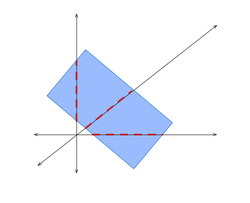Problem 5
 How many ordered triplets
(
a
,
b
,
c
)
of non-zero positive integers satisfy
How many ordered triplets
(
a
,
b
,
c
)
of non-zero positive integers satisfy
5 a + 6 b + 3 c = 5 0 ?
The answer is 13.
This section requires Javascript.
You are seeing this because something didn't load right. We suggest you, (a) try
refreshing the page, (b) enabling javascript if it is disabled on your browser and,
finally, (c)
loading the
non-javascript version of this page
. We're sorry about the hassle.
2 solutions
Since b and c contributes in multiples of 3,
5
0
−
5
a
=
3
∗
X
.....X is an integer.
So " a "can only be 1, 4, 7...corresponding numbers left to be absorbed by b, and c.... are
4
5
,
3
0
,
1
5
.
There has to be at least one c. Thus 6b can absorb
4
2
,
2
7
a
n
d
1
2
.
There can be.... 42/6 =7 " b "in 42 , .... 27/6 = 4 in 27,.... 12/6= 2 in 12.
7
+
4
+
2
=
1
3
since they must be non zero, the problem is equivalent to finding the number of non-negative triples of 5a+6b+3c= (50-5-6-3) = 36.
But then, this is the coefficient of x 3 6 in the power series of 1 / [ ( 1 − x 3 ) ( 1 − x 5 ) ( 1 − x 6 ) ] , that is, 13.
Log in to reply
Nice thinking about 36. How did you think of this power series ?
Can you please elaborate on this?
Nice solution.
5a+6b+3c=50 ===> 5a+3(2b+c)=50
Let 2b+c=y ==> 5a+3y=50
solve for 5a+3y=50 from a=1 (Since given that a,b,c are positive non zero integers)
We get (a,y)={(1,15),(4,10),(7,5)}
Now similarly Solve for values of b&c from y=2b+c={15,10,5}
We get (b,c)={(1,13)(2,11)(3,9)(4,7)(5,5)(6,3)(7,1) (1,8)(2,6)(3,4)(4,2) (1,3)(2,1)} fro y=15,10,5
==>Total number of distinct solutions=13